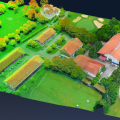
The School of Surveying & Spatial Information Systems at UNSW in Sydney is looking for students to fill three PhD and three Research Masters scholarships across three research areas in the field of navigation and earth observation research (NEO).
An informational video on NEO is available to stream at https://tv.unsw.edu.au/video/nav-and-earth-obs-research
The scholarships are valued at $27,000 per year (tax free), with funding coming from the Cooperative Research Centre for Spatial Information (CRCSI).
The three areas of interest include:
GNSS Ionospheric Delay Variance Modelling (PhD scholarship)
The major challenge for precise positioning using Global Navigation satellite Systems (GNSS) over moderate to long distances – tens to hundreds of kilometres – is the signal propagation delay changes in space and time are difficult to predict or model. This issue is of significant importance for the robustness of GNSS applications when approaching the solar activity maximum (in 2013) as it makes the reliable estimation of the integer carrier phase ambiguities very difficult. The project’s goal is to develop a low-complexity model for the ionospheric delay variance in order to develop more realistic statistical models and GNSS carrier phase data processing.
QZSS LEX Augmentation Signal Experiment (Research Masters scholarship)
The aim of this project is to evaluate the capability and feasibility of using the Japanese Quasi-Zenith Satellite System (QZSS) L-band Experimental (LEX) signal to provide a Precise Point Positioning service to GNSS users in Australia. This joint CRCSI-Japan project is a unique opportunity for Australian researchers to investigate the structure of the LEX signal and to better understand the feasibility of using this signal to deliver a nationwide real-time high accuracy positioning service. Among the research questions to be addressed is the LEX signal structure, message format, PPP algorithms, and performance vis-à-vis traditional differential GNSS techniques. Considerable field testing in different parts of Australia will be conducted.
Next Generation Geodetic Datum for Australia & New Zealand (2 PhD and 2 Research Masters scholarships)
Full exploitation of GNSS technology for high accuracy positioning applications in Australasia will rely on the successful implementation of a next generation geodetic datum. Both Australia and New Zealand, in their own distinct ways, will modernise the way they define and maintain their national geometric datums so as to be better linked to the International Terrestrial Reference Frame. This is an ambitious project, with four student scholarships being funded. The students will be expected to work closely with partners in the CRCSI, including several state government lands/spatial agencies, Geoscience Australia, and Land Information New Zealand.
A number of research questions will be addressed across several different work packages. These include: improving the accuracy of the national geodetic datum realisation by one order of magnitude, optimal design of the National Positioning Infrastructure (NPI) (including the GNSS reference station network), improved modelling of GNSS data, upgraded instrumentation, monumentation and management of the core geodetic component of the NPI, the automated computational processes to monitor the datum in four-dimensions, implementation of “eGeodesy” elements, developing practical means by which users will have access to a dynamic datum, and an analysis of regulatory and administrative impediments to the introduction of a dynamic datum.
Applicants should possess a Bachelor/Masters Degree in Surveying/Geomatics; Physics or other Science disciplines; Computing/IT; Mathematics/Statistics; Electrical, Mechanical, Telecommunications or other Engineering disciplines.
Only Australian/NZ citizens or those holding Permanent Residency are eligible, and the applicant’s academic credentials will be assessed by UNSW Graduate Research School (http://www.grs.unsw.edu.au).
For more information and to apply, contact Associate Professor Samsung Lim (s.lim@unsw.edu.au), Director of Postgraduate Studies.







